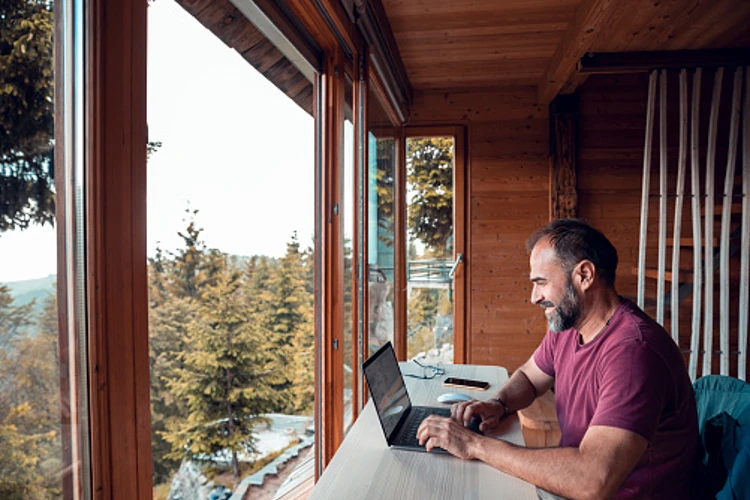The rise of remote work and the digital nomad lifestyle has had a significant impact on the European market environment in recent years. Some of the ways that this trend is impacting the market include:
- Productivity: Remote work and digital nomads are able to work from anywhere, which can lead to increased productivity, as they are not limited by geographical boundaries.
- Talent attraction and retention: Remote work can attract top talent from around the world and help companies to retain employees who would otherwise leave for better work-life balance.
- Real estate: The trend of remote work has led to a decrease in demand for office space, which has affected the commercial real estate market in some areas.
- Business travel: Remote work has reduced the need for business travel, which has led to a decrease in demand for travel-related services such as hotels, airlines, and rental cars.
- Technology: Remote work has increased the demand for technology solutions, such as video conferencing and collaboration tools, to facilitate communication and collaboration among remote teams.
- Remote infrastructure: Remote work has increased the need for better internet connectivity, more reliable power supply and other infrastructures to support a remote workforce.
- Consumer behavior: Remote work has changed consumer behavior, as people are now able to work from anywhere, they are able to live in different places, which can lead to changes in the housing and retail markets.
- Remote work policies: Remote work has led to the creation of new policies by companies and governments to support this way of working, such as tax breaks, subsidies and other incentives.
- Urban planning: Remote work has led to changes in the way cities are planned, as they now need to take into account the needs of remote workers, such as internet connectivity, public spaces, and access to services.
- Immigration laws: Remote work has also led to changes in immigration laws, as digital nomads are looking for more flexible ways to live and work in different countries.
It’s worth noting that, remote work and the digital nomad lifestyle are still a relatively new trend and its impact on the market will continue to evolve as more people adopt this way of working.

How this trends change the Real State market?
The trend of remote work and digital nomad lifestyle has had a significant impact on the real estate market in Europe and around the world. Some of the ways that this trend is impacting the real estate market include:
- Decrease in demand for office space: Remote work has led to a decrease in demand for office space as companies are no longer required to provide physical space for all of their employees. According to a study by Savills, the trend of remote working could reduce demand for office space by 30-50% in the long-term.
- Increase in demand for single-family homes and vacation properties: Remote work has led to an increase in demand for single-family homes and vacation properties as people are now able to work from anywhere and are looking for more space and better amenities.
- Changes in location preferences: Remote work has led to changes in location preferences, as people are now able to live in different places, which has led to an increase in demand for properties in less urban areas, and smaller towns and cities.
- Increase in online home sales: Remote work has led to an increase in online home sales, as more people are looking to buy properties remotely.
- Changes in rental market: Remote work has led to changes in the rental market, as more people are looking for short-term rentals, which can be more flexible than long-term leases.
- Increase in co-living and coliving spaces: Remote work has led to an increase in the popularity of co-living and coliving spaces, as more people are looking for affordable and flexible housing options.
- Increase in vacation home rentals: Remote work has led to an increase in vacation home rentals, as more people are looking for alternative living arrangements that allow them to work remotely from vacation destinations.
- Changes in real estate investment: Remote work has led to changes in real estate investment, as more people are looking for properties that can generate rental income, such as vacation homes and co-living spaces.
- It’s worth noting that, these projections are based on current trends and they can change depending on the policies and actions taken by governments and companies. Also, the impact of remote work and digital nomad lifestyle on the real estate market can vary depending on many other factors.
How does it change the urban planning and society organization?
The trend of remote work and digital nomad lifestyle has had a significant impact on urban planning in Europe and around the world. Some of the ways that this trend is impacting urban planning include:
- Decrease in demand for office space: Remote work has led to a decrease in demand for office space, which has affected the commercial real estate market in some areas, as more companies are able to operate with fewer physical office locations.
- Changes in location preferences: Remote work has led to changes in location preferences, as more people are able to live and work in different places. This has led to an increase in demand for properties in less urban areas, and smaller towns and cities.
- Changes in transportation: Remote work has led to changes in transportation, as fewer people are commuting to work, which can lead to a reduction in traffic congestion, air pollution and greenhouse gas emissions.
- Changes in public spaces: Remote work has led to changes in the use of public spaces, as fewer people are using parks and squares for commuting or working.
- Changes in infrastructure: Remote work has led to changes in infrastructure, as more people are working from home, which can lead to a need for better internet connectivity, more reliable power supply and other infrastructures to support a remote workforce.
- Changes in the use of buildings: Remote work has led to changes in the use of buildings, as more people are working from home, and commercial spaces are being repurposed for other uses.
- Changes in housing demand: Remote work has led to changes in housing demand, as more people are looking for single-family homes and vacation properties, which can lead to changes in the housing market.
- Changes in zoning laws: Remote work has led to changes in zoning laws, as more people are working from home, which can lead to changes in the regulations for home-based businesses.
It’s worth noting that, these projections are based on current trends and they can change depending on the policies and actions taken by governments and companies.









